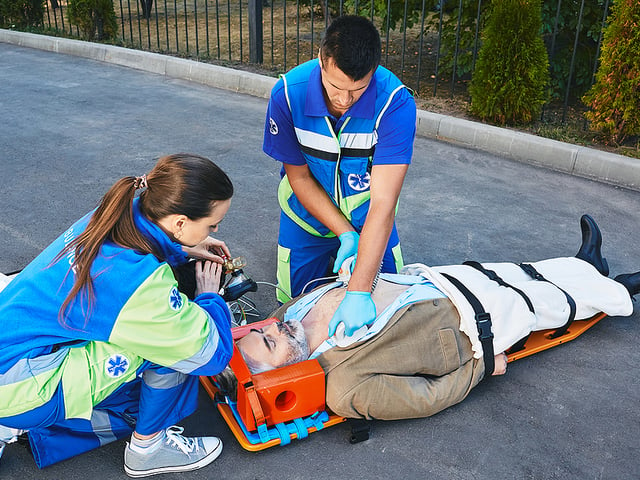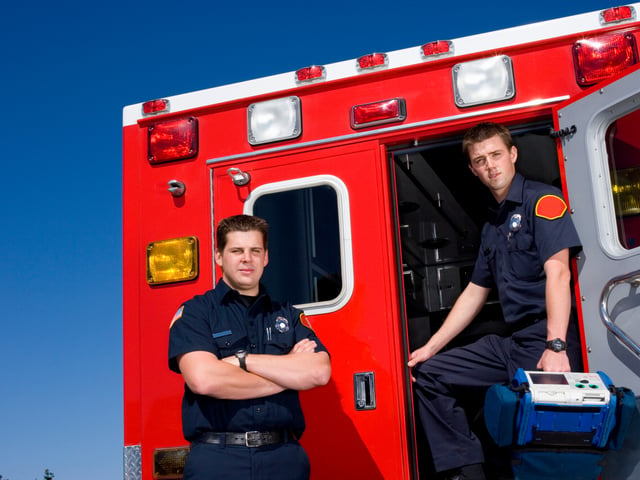
How Hard is the EMT Test?
EMTs (Emergency Medical Technicians) are required to have strong medical knowledge and quick decision-making skills. Working in emergency situations, such as car accidents or natural disasters, they are often the first to arrive on the scene. To become an EMT, one must pass the EMT certification exam. Many aspiring EMTs wonder, “How hard is the EMT test?”
This article will provide a comprehensive overview of the EMT test, the topics covered, and tips on how to do well on the exam. We aim to help test-takers prepare themselves to the best of their abilities and succeed in their pursuit of becoming an EMT.
Overview of the EMT Test
The National Registry of Emergency Medical Technicians (NREMT) administers the EMT exam to certify that candidates have the knowledge and skills necessary to provide emergency medical care. The test is designed to evaluate test-takers’ ability to perform in real-life emergencies. The EMT test is divided into two sections: the cognitive exam and the psychomotor exam.
Cognitive Exam
The cognitive exam is a multiple-choice test that measures the test-taker’s ability to comprehend, apply, and analyze information related to emergency medical care. It is computer adaptive, meaning the difficulty level adjusts up or down depending on the last response. If you are answering many questions correctly, the test will become progressively more challenging as you take it. While this may feel frustrating or stressful while you’re taking the exam, remember that increased difficulty indicates that you’re likely doing well. The EMT test covers a wide range of topics, including:
-
Airway, Respiration, and Ventilation
-
Trauma
-
EMS Operations
-
Obstetrics and Gynecology
-
Cardiology and Resuscitation
The cognitive exam consists of 70 to 120 questions, and test-takers are given two hours to complete the test. Less than 1% of test-takers run out of time on the exam, meaning you should easily be able to answer questions in the recommended time allotment of 30-60 seconds per question. While most test-takers find the EMT test somewhat challenging, the passing score for the cognitive exam is typically 70% or higher, meaning the odds are in your favor for test-day success.
Psychomotor Exam
The psychomotor exam evaluates the test-takers ability to perform various skills related to emergency medical care. The test consists of a series of hands-on assessments, such as:
-
Patient assessment
-
Spinal immobilization
-
Bleeding control
-
Joint immobilization
-
Oxygen administration
-
Cardiac arrest management and AED use
The psychomotor exam is usually conducted at a testing center and takes around two hours to complete. Test-takers must successfully complete all the required skills to pass the exam.
Tips to Do Well on the EMT Test
Preparing for the EMT test requires dedication and hard work. Here are some tips to help test-takers do well on the EMT certification exam:
Study Regularly
The EMT test covers a wide range of topics related to emergency medical care. Studying regularly and making a schedule that covers all subjects is essential. The NREMT does not provide or recommend specific study material, so test-takers can use any reputable study guides, textbooks, and online resources to prepare for the exam.
Study a Variety of Materials
Test-takers should use various high-quality study materials that cover all the topics tested on the EMT test. Review the latest version of The American Heart Association’s Guidelines for Cardiopulmonary Resuscitation and Emergency Cardiovascular Care, and utilize preparation methods such as study guides, flashcards, and study courses to make sure you do your best. While they may make you feel good at the moment, be wary of any websites that offer practice questions that feel “too easy.” The real EMT exam can be difficult, so practice tests that don’t pose any challenge were likely not written with actual test standards in mind.
Take Practice Tests
Taking practice tests can help test-takers get familiar with the format and content of the EMT certification exam. Practice tests can also help identify areas of weakness and allow test-takers to focus on improving those areas. Remember that most practice tests are not computer-adaptive, so the questions you take while studying will not purposefully decrease or increase in difficulty like they will on test day.
Practice Patient Assessment
Patient assessment is a crucial aspect of emergency medical care. It is essential to practice patient assessment regularly to develop strong assessment skills. Test-takers can practice with fellow EMT students or use online simulation tools to hone their skills. If you’re more of a visual learner, YouTube has many videos that feature the skills you’ll need to demonstrate during the psychomotor portion of the exam.
Master Airway Management
Proper airway management is critical in emergency medical care. Test-takers should master various techniques, such as the head tilt-chin lift and the jaw thrust, to ensure they can maintain a clear airway.
Focus on High-Yield Topics
While it’s important to give yourself plenty of time to prepare for the EMT exam, sometimes life can get in the way of studying. If you are short on time before the test, focus on the essentials. Every topic is important, but some subjects on the EMT test are more predominant than others. Understanding high-yield topics, such as airway management, patient assessment, and medical emergencies, is crucial to do well on the exam, as these topics are often the most heavily tested.
Get Enough Sleep and Eat Well
The EMT test is a mentally and physically demanding exam. To do your best on test day, getting enough sleep and eating well before the exam is crucial. Test-takers should avoid caffeine and other stimulants that cause anxiety or affect sleep.
Prepare to Do Well on the EMT Test!
Passing the EMT exam is a significant achievement that opens the door to a career in emergency medical services. Following the strategies and tips outlined in this guide will prepare you to tackle the exam and start your journey as an EMT. Remember to study hard, stay focused and motivated, and don’t give up. Good luck with your EMT exam!
Keep Reading

Emergency Medical Technician Test Blog
How Many Questions are on the NREMT?
The National Registry of Emergency Medical Technicians (NREMT) exam is …

Emergency Medical Technician Test Blog
What Is a Passing Score on the NREMT Exam?
The job outlook for EMTs and paramedics is strong. The Bureau of Labor …

Emergency Medical Technician Test Blog
How to Pass the NREMT on the First Try
There are many great reasons to become an Emergency Medical Technician …